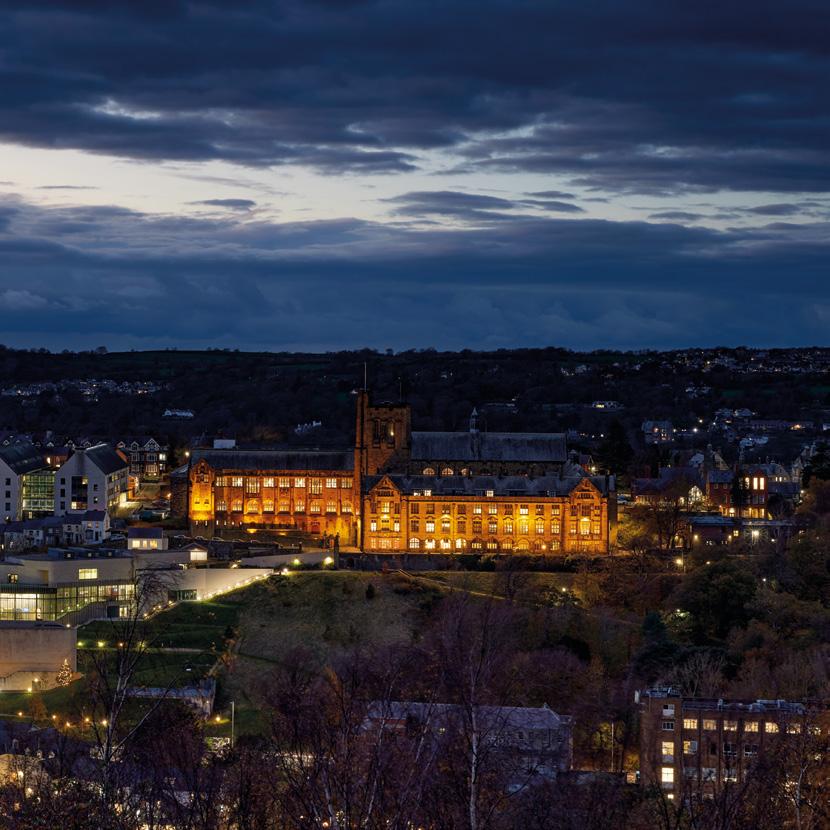






Congratulations!
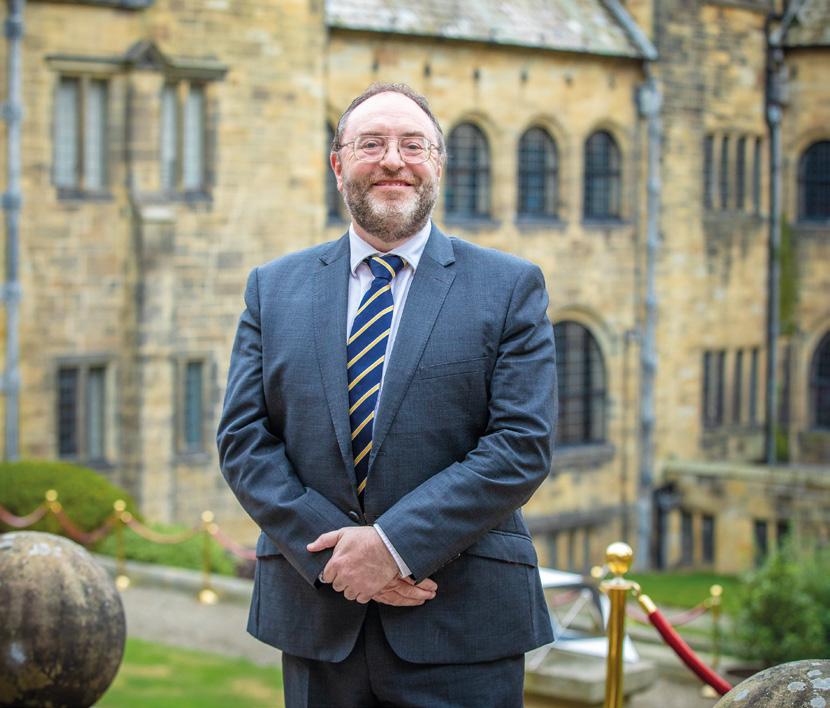
Graduation is a significant milestone in every student’s life and today we are delighted to celebrate your achievements here at Bangor University!
Your university experience has taken you on a journey of growth and transformation. I would like to pay special tribute to you for your commitment and dedication to learning.
Graduation is the most important date in the higher education calendar. As Vice-Chancellor, I take great pleasure in attending these ceremonies, witnessing your success and celebrating the transformative power of a university education. We are delighted to be able to share the celebration for all our graduands with families, friends and supporters.
Whatever your chosen path, your University wishes you well for the future, and does so in the knowledge that Bangor has helped you to expand your mind and develop your skills, providing you with the knowledge, experience and networks to assist you as you navigate the next stages of your life.
Please remember that your connection to Bangor University will last a lifetime. You are now part of our thriving international alumni community and we will strive to continue to support you, wherever you are in the world. On behalf of the staff of the University, I wish you every success in achieving your goals.
Professor Edmund Burke Vice-Chancellor
2024 marks the 140th anniversary of Bangor University, celebrating 140 years of academic excellence, world leading research, and transformative student experiences.
When the college first opened in 1884, it enrolled 58 students onto courses ranging from Greek, Latin, English and Welsh to Chemistry, Mathematics, Botany and Agriculture. As new departments and subjects were established, student numbers grew to around 300 at the turn of the 20th century. Major growth occurred in the 1950s and 1960s, and today over 11,000 students study here.
Today our world-leading research is seeking solutions to some of society’s most challenging problems - from improving health and wellbeing, protecting the environment, identifying low carbon energy solutions and providing cutting-edge solutions to advance the global 5G economy.
Our teaching is informed by original research in many of our disciplines. Students can be taught by academic staff who are research leaders in fields as diverse as healthcare and medical sciences, environmental science, business and music.
Bangor University: past, present and future
1884
Funded in part by quarrymen and farmers, Bangor University first opened its doors on 18 October 1884, based in an old coaching inn called the Penrhyn Arms.
1893 Bangor became one of the three original constituent colleges of the University of Wales.
1903
The city of Bangor donated a 10-acre site overlooking the city at Penrallt for a new building, and substantial sums of money were raised by local people to help meet the cost.
1907
The foundation stone of the University’s present Main Arts site was laid by Edward VII on 9 July 1907.
The official opening of the University’s Main Arts building, built by Henry T. Hare, architect of London; together with some of the arts and social science buildings and part of the library.
The University’s science departments moved to new, purpose-built accommodation which had been constructed with the assistance of funds raised by the North Wales Heroes Memorial Council, which also oversaw the construction of the Memorial Arch (off Deiniol Road) in 1923, to commemorate the North Walians who had lost their lives in the war.
1939
On 23 August 1939, a week before the Second World War began, the National Gallery in London began to evacuate its most precious paintings to Bangor, to escape the expected aerial bombing. More than 500 paintings, including works by Botticelli, Rubens and Rembrandt, were stored at the University’s Prichard-Jones Hall.
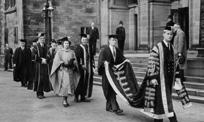
1949
On 28 April 1949, Her Majesty Queen Elizabeth II, then HRH Princess Elizabeth, was conferred the degree of Doctor of Music by HRH The Duke of Edinburgh, the newly-celebrated Chancellor of the University.
1952
The establishment of SVB (Student Volunteering Bangor), the volunteering branch of the Students’ Union.
The University shared in the general expansion of higher education in the UK following the Robbins Report, with several new departments and new buildings.
The Beatles visited The Normal College for a lecture on Transcendental Meditation by the Maharishi Mahesh Yogi. The visit proved to be a pivotal date in the history of the group, as it is here that the news broke of the death of their manager, Brian Epstein.
Student protests in the 1970s focused on calls to expand the role of the Welsh language. A campaign against the College’s language policy by Cymdeithas y Cymric (The Cymric
Society), saw slogans painted in Welsh on the walls of the Main Building, resulting in several suspensions of these activists.

The protests and expulsions led to the establishment of the Bangor Welsh Students’ Union (Undeb Myfyrwyr Colegau Bangor – UMCB) and the opening of a Welsh Hall for the residents of the University, Neuadd John Morris-Jones.
The merger of St Mary’s College was concluded.
The merger of The Normal College was completed.
The launch of Storm FM, the official student radio station for Bangor University, which went on air in March 2003.
The change of name to Bangor University, or Prifysgol Bangor in Welsh, was instigated by the University, including the granting of degree-awarding powers to Bangor University itself.
Bangor University signed a deal to create a new college in China; Bangor College China (BCC).
The opening of St Mary’s Village.
The opening of Pontio Arts and Innovation Centre, where over 1000 people enjoyed a Welcome Day at the centre.
Completion of M-SParc, the Universityowned £20m science park on Anglesey is Wales’ first dedicated science park.
Bangor University celebrates 100 Years of Music with a year-long programme of events, marking 100 years since composer E. T. Davies was appointed as the University’s first full-time Director of Music.
The UK Government’s Research Excellence Framework ranks Bangor Top 30 in the UK for the societal impact of its research. 85% of our research is considered world-leading or internationally excellent.
2023
The establishment of a new North Wales Medical School is announced supported by Welsh Government and in partnership with Betsi Cadwaladr University Health Board.
2024 Bangor University celebrates its 140th anniversary.

Bangor University’s Main Arts Building remains the focal point of the University and was described by Cadw, the Welsh Government’s historic environment service, as ‘architecturally one of the most significant public buildings of the period in Britain’.
It was built between 1907-11 by Henry T. Hare, who was chosen following an architectural competition run by the University, following acquisition of the site in 1903. The foundation stone was laid by Edward VII on 9 July 1907, and an official opening held on 14 June 1911.
The resulting building is in a ’Collegiate Tudor‘ style and is based on the universities of Oxford, Cambridge and Durham, with Arts and Crafts influences.
The building is designed around two quadrangles: the Main Quadrangle; and the Inner Quadrangle, which is open to the public on Graduation Day and for special events.
The Prichard-Jones Hall, in which today’s graduation ceremony takes place, is named after Sir John Prichard-Jones, a draper of humble Anglesey origins who made his fortune in London’s Regent Street as managing director of Dickens and Jones department stores, acquired by Harrods in 1914.
Sir Prichard-Jones donated £15,000 towards its construction, encouraged to help the developing college in this way by David Lloyd George, an active supporter of the University, who was then Chancellor of the Exchequer, before going on to become UK Prime Minister.
The hall’s interior has changed very little since its opening in 1911. The shields which decorate the top of the walls are representations of the ancient North Wales boroughs, and the pipe organ was installed following the closure of
the local Tabernacle church in the early 1970s. The electroliers (electrified chandeliers) still hang from the ceiling, and the walls are lined with the original wainscot panelling.
Used frequently by the University and the wider community, many generations of students have sat exams, danced and attended graduation ceremonies here. The hall also has a long tradition of hosting musical entertainment for North Wales, with performers including Sir Bryn Terfel and Aled Jones MBE.



The Graduation ceremony
Some 3,000 students will be graduating during these graduation ceremonies.
This is an opportunity to celebrate and reflect on the achievements of our students and enables the University community to acknowledge your accomplishments.
It is with great pride that we are now able to see our graduates taking their next exciting steps into the world, as so many others have done before them.
Whether you are a graduand, a relative or a friend, we hope you have an enjoyable and inspiring day.
Llongyfarchiadau! / Congratulations!
The procession
Each ceremony begins with a procession. It is led by the Chief Marshal – a senior member of the University’s administrative staff –whose role is to ensure that the ceremony proceeds smoothly.
Following the Chief Marshal in the procession will be several sections, each led by a Marshal(s) who are officers of the University:
Section 1: Academic staff and civic dignitaries
Section 2: Heads of School and Heads of central Professional Services departments
Section 3:
Senior officers of the University, including Pro-Vice-Chancellors and the Presenter
Section 4: Honorary Fellows and their Presenters
Section 5:
The Chancellor’s procession, including the Vice-Chancellor and the Chancellor (or his deputy)
The final part of the procession, the Chancellor’s procession, is led by the Mace-Bearer, also a senior member of the University’s administrative staff.
The Mace
The Mace is the symbol of the authority of the University and in the ceremony it always precedes the Vice-Chancellor.
The Mace was commissioned by the Old Students’ Association to commemorate the University’s centenary in 1984. The mace-head, crowned by a shield bearing the University coat of arms, is made of Bethesda slate. This symbolises the generosity of the local slatequarrymen who, in the early 1880s, gave part of their weekly wages to fund the establishment of the University.
Two ebony staffs carried by the Marshals are the gift of the fifth Lord Kenyon, who in 1981 completed 36 years of service as President of the University. On the top of the staffs are shields bearing the coats of arms of the University and of the Kenyon family.
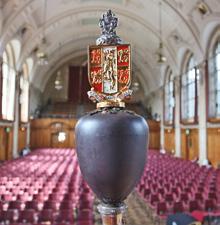
Bangor University’s Chancellor is the academic and physicist Professor Sir Robin Williams.

The Chancellor is the University’s ceremonial head and one of its most prominent ambassadors. They work with the Vice-Chancellor and other senior officers to promote the University’s achievements at home and overseas.
Sir Robin is a Bangor graduate and a strong advocate of the bilingual nature of the University. He was appointed to the role in November 2022.
Sir Robin is an authority in the field of semiconductors and his research has been important in the development of digital electronics and the farreaching changes in computing and communications. Working closely with industries worldwide, he developed new methods for the study of semiconductors and was one of the first to use synchrotron radiation to study the surfaces of solids. Knighted in the Queen Elizabeth II’s Birthday Honours in 2019 for services to higher education, research and the
Welsh language, Sir Robin has served on many international and UK policy and funding bodies and on ministerial advisory groups for economic development and education in Wales.
He is a former chair of the Science Advisory Council for Wales. He was a member of the Innovation Advisory Council of Wales and was a founding fellow of the Learned Society of Wales. In 2022, the National Eisteddfod Science and Technology Medal was awarded to Sir Robin for his lifelong contribution to science.
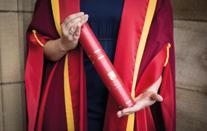

“I’ve been associated with this great bilingual institution since I was a student here in the Sixties and I am proud to be able to work with the University to promote its unique qualities and successes.”
SIR ROBIN WILLIAMS
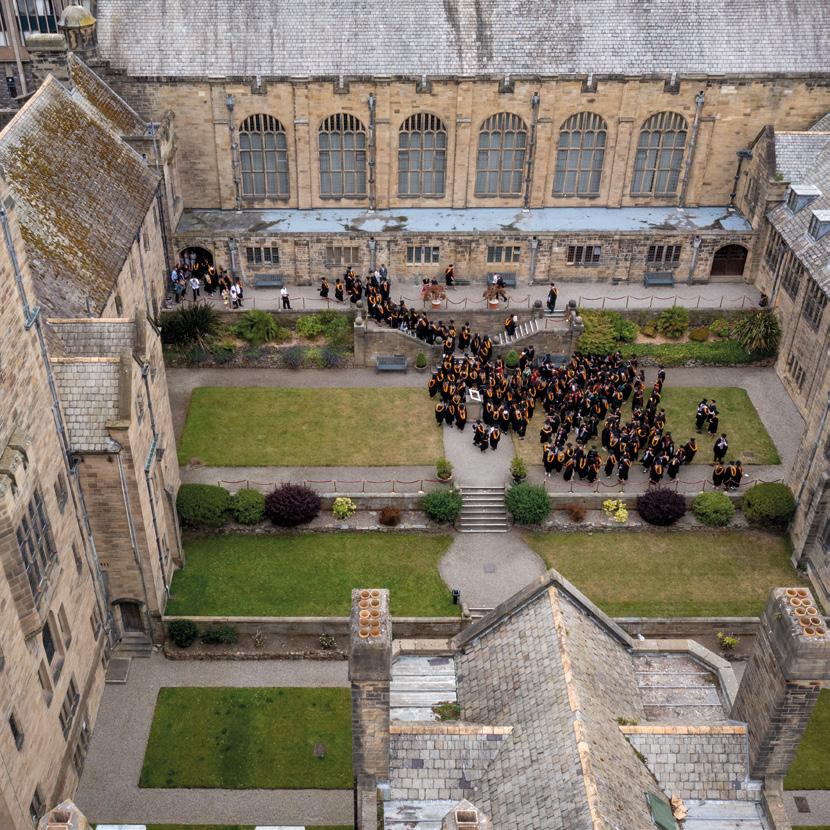
Before the ceremony commences there will be a programme of music, ending with the processional music, which signals the start of the ceremony.
Processional:
John Stanley – ‘Trumpet Voluntary’
The procession
The Congregation is asked to stand as the procession enters the hall. This marks the formal start of the ceremony.
Introduction
The ceremony opens with a recitation by a student of the University of an extract from a poem, ‘Y Coleg ar y Bryn’ (‘The College on the Hill’) by the late Gwyn Thomas. The extract will be read in Welsh and English. Gwyn Thomas, who died in 2016, was a former Professor of Welsh at the University and National Poet of Wales from 2006 to 2008.
The poem was commissioned by His Majesty King Charles III, then HRH The Prince of Wales, to mark the centenary in 2007 of the laying of the foundation stone of the Main University Building.
The resolution
The Presenter, a senior academic, reads the resolution in Welsh and English granting authority to the Vice-Chancellor to award degrees, and also presents each group of students for their appropriate degrees and diplomas with the words (in Welsh):
Honourable Vice-Chancellor, I present to you these students who have gained the degree of (…title of degree…) in (…name of the subject or subjects of study…)
An Introducer, usually the ProVice-Chancellor of the relevant department or his/her deputy, introduces students to the ViceChancellor by reading out their full names. Each student individually crosses the stage to be greeted by the Vice-Chancellor and the Chancellor (or his deputy).
The Vice-Chancellor formally admits groups of students to their degrees by proclaiming (in Welsh):
admit you to the degree of (…title of degree…) and to all privileges of that degree.
The Chancellor (or his deputy) greets the graduates (in Welsh):
Congratulations on receiving your degree today.
The formula is then repeated for each group of students. Those named in the appropriate groups in the programme will be presented for their degrees in absentia.
Approximately halfway through the ceremony, there will be a short musical interlude.
In some graduation ceremonies, the University will award an Education and Student Experience Award to an individual member of staff who is considered to have made an outstanding contribution to teaching and/or the support of learning. Nominations for Education and Student Experience Awards are made by those best able to judge –the students themselves.
In some graduation ceremonies, towards the end of the ceremony, Honorary Fellowships and Degrees are conferred by the University on individuals who have made a distinguished contribution to their chosen field of endeavour and whom the University wishes to honour. These are conferred by the Vice-Chancellor.
The ceremony is closed with an address to the new graduates and guests.
Fathers (national anthem of Wales)
The Congregation is asked to stand as the processional music begins and the procession leaves the hall.
Processional:
F. Mendelssohn – ‘War March of the Priests’
Our Honorary Fellowships & Degrees are prestigious awards bestowed upon distinguished individuals who have a connection with the University, or with Wales, and who have made an outstanding contribution to their chosen field.
Contribution to Welsh Culture, Language, Music, and the Arts Outstanding Scholarship and Innovation



Manon Steffan Ros is a prominent Welsh Linda Gittins MBE an alumna of Bangor Alumna Joan Edwards Head of Living Seas novelist, playwright, scriptwriter, and University, co-founded Cwmni Theatr Maldwyn at The Wildlife Trusts has spent over 30 years musician who holds a significant role in the in 1981 and is renowned for producing campaigning, informing and influencing behind Welsh Language literary sphere. Last year, Welsh-language’s best and most iconic the scenes, to protect the diversity of marine Manon was awarded the Yoto Carnegie Medal theatre shows. Collaborating with Penri life around our shores. She has a substantial for her work ‘The Blue Book of Nebo.’ This is Roberts and the late Derec Williams she has knowledge of marine biodiversity, marine a translation by Ms Ros of her own novel, Llyfr written and produced numerous productions. ecosystems, and maritime industries and Glas Nebo, which won the Prose Medal at the In so doing, she has supported and shaped within the Trusts, has responsibility for the 2018 National Eisteddfod and three Wales the careers of many young talents and her national policy on marine conservation. Book of the Year Awards. songs are well-known. Her contribution to Welsh music is priceless.

Mr Mark Williams PLY
Former Paralympic swimmer and medallist Mark Williams transformed an idea for colorful prosthetic leg covers into an innovative business. Together with his wife Rachael, he founded LIMB-art, a company that instils pride in users’ prosthetics. Many customers have reported a positive change in their attitude and confidence when wearing their prosthetic limbs. LIMB-art has received several accolades, including the prestigious King’s Award for Enterprise.

Raised on a family farm near Colwyn Bay, Professor Wynne Jones graduated in Agriculture from Bangor University in 1970. As the Principal and Chief Executive of Harper Adams University College Professor Jones led its transition to university status with Research Awarding Powers. Awarded an OBE in 2009 for his services to Agricultural Higher Education, Professor Jones also received also received numerous accolades for his contributions to the environment and agriculture including the LANTRA CYMRU’s Lifetime Achievement Award in 2019. His impactful leadership also earned him the role of Chair of the Royal Welsh Agricultural Society, marking a significant milestone in the history of the Royal Welsh Show.



After earning his PhD in Marine Zoology from Despite being an unlikely campaigning hero, Noel Thomas, a former sub-postmaster from Bangor University, Professor John Philip Alan Bates a former sub-postmaster from Anglesey, gained recognition for his significant Sumpter went on to become a distinguished Llandudno has dedicated two decades to role in addressing the widespread miscarriage ecotoxicologist and a global leader in his advocating for justice and clearing the names of justice known as the Horizon scandal in field. His impactful journey began in the late of Post Office managers involved in what is the UK. Engaging in a prolonged legal battle, 1970s when he investigated the phenomenon considered the most extensive miscarriage he campaigned alongside others to clear the of ‘intersex’ fish in the River Lea, linking it to of justice in UK history. Alan founded the names of Post Office managers who faced chemical pollution from industrial, plastic, Justice for Sub-postmasters Alliance (JSFA) in criminal convictions due to faulty accounting pharmaceutical, and cosmetic sources. This 2009, playing a leading role in the legal battle software. His commitment to seeking justice led to extensive research on mixed chemical to seek justice for those whose lives for those affected by the scandal exemplifies pollution, covering a wide range of substances were adversely affected and to ensure his resilience and determination to expose in rivers, raisig public awareness of compensation for those wrongly accused. the truth. environmental contamination. With five others from JFSA, he took the Post Office to court on behalf of 555 claimants.

Carl was Chief Constable of North Wales Police and national policing lead for Wales during Covid. His support for our partnership in setting up the professional policing practice degrees has been invaluable. He held the portfolio for Equality, Diversity and Inclusion for the National Police Chiefs Council and his commitment to those principles echoes and resonates with those of the University.

Alumna Dr Susan Chomba, one of the firstever graduating European Masters in Sustainable Tropical Forestry graduates is now a distinguished global ambassador for the Race to Zero and Race to Resilience under the UN High-Level Champions for Climate Action. She was named one of the Global Landscapes Forum’s ‘16 Women Restoring the Earth’ in 2021 and featured on the BBC list of 100 inspiring and influential women from around the world in 2023.
Congratulations, you’re a graduate!
You are now joining our diverse community of alumni who are excelling in their chosen careers with the skills and support they have received at Bangor.
‘Alumni Bangor’ is the University’s association for former students. We don’t want to lose touch with you after graduation. By maintaining lifelong links with past students, we are committed to promoting your achievements and facilitating contact between friends and departments, and supporting new networks.
Our graduate community transcends barriers of generation and geography with alumni worldwide meeting and helping each other – in many cases without ever having met during their student life. You are now a member of this invaluable network!
To ensure that you’re part of our growing alumni network, make sure we have your current contact details by completing our online update form and opting-in to alumni communications.
As a Bangor alumnus, you can benefit from a range of services, including:
• Alumni E-News: we send out monthly e-newsletters to keep you up-todate with the latest news from the University, including details on reunions and events and information about the research and activities taking place in our Schools and Colleges.
• Ongoing careers advice and support.
• Library access: alumni can continue to access the University’s excellent libraries with an Alumni Library Card.
• Information about alumni networks and groups, including groups on social media such as LinkedIn and Facebook.
Where will your journey take you?
Stay in touch with our alumni community and share your own story.
bangor.ac.uk/alumni
Deepen your understanding by continuing your higher education journey with us
Our postgraduate taught courses offer access to our subject matter experts and advanced facilities, helping you develop skills and gain the right qualifications.
Students who have graduated at Bangor may be eligible to receive a discount of up to 20% for postgraduate taught courses in the 2024/25 academic year.
Practice your research skills surrounded by peers and professors who share your passion for advancing the world’s understanding of your chosen area of study.

communications.
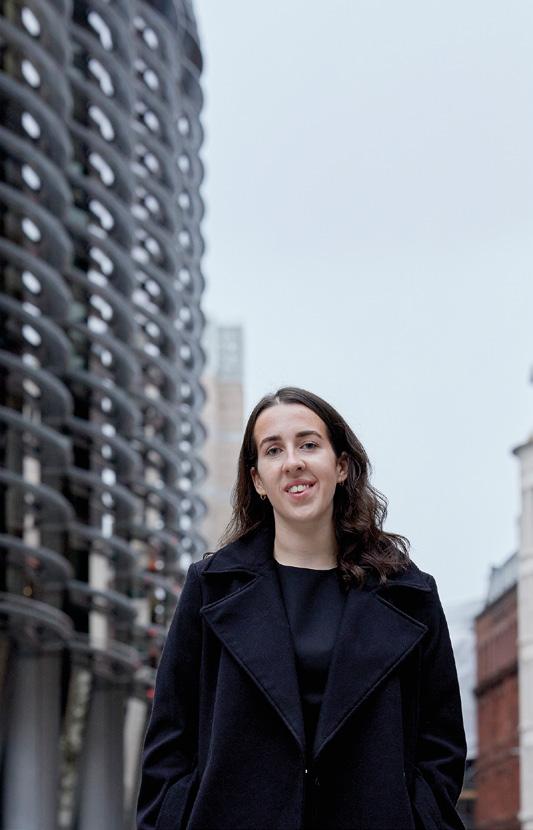
‘Opportunities at Bangor helped secure my role in an international company.’
Did you know that as an alum of Bangor University, you can use the University’s Careers and Employability Service for three years after you graduate?
Access to careers advice and information can be just as important to you after graduation as when you were a student.
Graduation is an exciting and important milestone for every one of us - the period after graduation is full of change, yet it can also be challenging.
Here are some of the ways the Careers and Employability Service can help our graduates:
• CV and application support and feedback.
• Interview preparation.
• Assisting unsure or worried graduates on ‘what to do next’.
• Improve job / opportunity searching.
• Trying new approaches where graduates have been unsuccessful with their applications.
• Explore ways of gaining experience and establishing / improving their networks.
Bangor University graduates can also take advantage of a ‘for life’ account (through our CareerConnect online portal), offering a host of tools, resources and opportunities.
As a Bangor University graduate, all you need to do to continue / reconnect with our service is set up a graduate account on Bangor CareerConnect (careerconnect.bangor.ac.uk) - you’ll be invited to do this as soon as you graduate. Sign up using your personal email address and we will merge your student account into your new graduate account.
